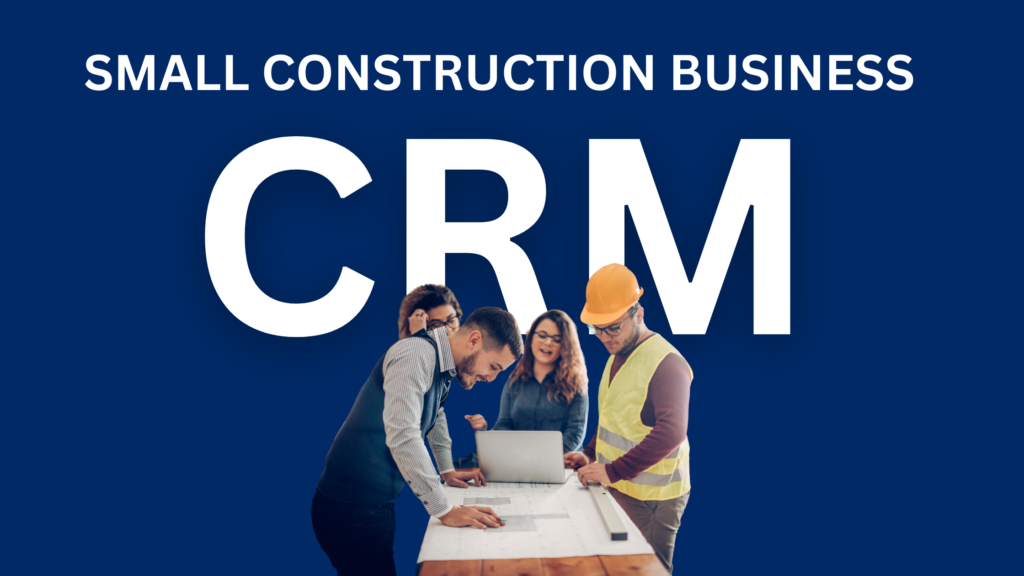
The Role of CRM Tools in Modern Construction
Running a small construction business comes with its fair share of challenges. You’re juggling multiple projects, following leads, ensuring budgets don’t run away from you, and keeping your clients happy. Yet, many business owners still rely on outdated methods such as spreadsheets or old-school manual logs that can easily get out of hand.
Enter CRM (Customer Relationship Management) tools: This helps straighten out operations and preserve small construction businesses in an aggressive market space. CRM tools are not just for those in sales and corporate giants, they can also solve the problems of small construction businesses — from managing clients to increasing operational efficiency.
What is a CRM Tool for Small Construction Businesses?
CRM tools are software that help businesses manage their client relationships and stakeholders. A CRM system is like a hub for small construction businesses, where all client data, project timelines, budgets, and communication are centralized.
Unlike generic CRM tools used by your sales teams, CRM tools for small construction businesses are tailored to industry-specific needs. These tools serve the goals of tracking client interactions, scheduling site visits, and storing project blueprints, all in one place.
Benefits of Using a CRM Tool in Small Construction Businesses
1. Streamlined Client Management
Imagine having all of your client info right at your fingertips: the conversations you’ve had, updates on projects, payment histories — it’s all in one place. That’s a great way to set reminders for follow-ups, track your feedback, and maintain a good relationship with your client. CRM tools for small construction businesses make sure that you never miss a client.
2. Improved Team Collaboration
You can build better construction projects by collaborating seamlessly among your team, such as those working on site, architects, and clients. CRMs update information in real-time so that no one is out of touch with the others.
3. Cost Efficiency
CRM tools for small businesses can save you time and can lower your labor costs by automating tedious tasks. It can include tasks like sending out an invoice or staying in touch with leads. These resources can be reallocated to critical areas, such as expanding your business’s client base.
4. Data-Driven Decisions
A CRM system doesn’t just store information—it provides analytics that help you identify trends, such as which projects are most profitable or which clients are worth retaining.
How to Choose the Right CRM Tool for Small Construction Businesses
1. Understand Your Business Needs
Before jumping into a CRM system, it’s essential to identify the specific pain points your business faces. Are you struggling with lead tracking, client communication, or project management? Knowing your priorities helps narrow down the features you’ll need.
2. Look for Customizable Features
Construction businesses come in all shapes and sizes, and no two firms operate identically. A good CRM should be customizable to match your workflows, whether you focus on residential renovations or commercial projects. This will make it the right CRM tool for your small business.
3. Ease of Use and Mobile Accessibility
Your team likely spends more time on-site than in an office. A CRM tool for small construction businesses should have a user-friendly interface and mobile compatibility so everyone can access crucial information from anywhere.
4. Integration with Existing Tools
Does your business already use accounting software, project management tools, or inventory trackers? The best CRM for you should integrate seamlessly with these systems, reducing redundancy and streamlining operations. Moreover, you can also go for an all-in-one CRM tool for your small construction business.
5. Budget Considerations
Small construction firms often operate with tight budgets, so affordability is key. Look for CRM tools offering tiered pricing or features that deliver the best ROI.
Unique Features BLDOn.com Offers for Small Construction Businesses
1. Project-Specific Dashboards
We offer dynamic dashboards designed specifically for your construction projects. These dashboards allow you to track project timelines, budgets, and client communications all in one place, ensuring nothing slips through the cracks.
2. Lead Nurturing Tools
Another standout feature is our lead management system, optimized for small construction businesses. This tool helps you identify potential clients, track follow-ups, and convert leads into long-term customers efficiently.
3. Budget Tracking and Cost Estimation
Construction budgets for small businesses can be very difficult to manage. With our advanced budgeting tools, you can keep an eye on costs, forecast expenses, and ensure your projects remain profitable.
4. Document Storage and Sharing
Gone are the days of misplaced contracts or missing blueprints. With our centralized document storage, you can upload, organize, and share files directly through the platform.
5. Task Automation
From invoicing to sending reminders, we can help you automate all your time-consuming tasks. This will allow you to focus on delivering quality work rather than administrative duties.
Key CRM Features Small Construction Businesses Should Leverage
1. Lead Management
Lead management is effective only if it helps you not to lose any possible clients. CRM tools for small businesses let you track every interaction, schedule follow-ups, and nurture your leads until they are ready to sign on the dotted line.
2. Project Management and Scheduling
Small construction businesses have to keep their projects on track. Therefore, your CRM should have Gantt charts, task lists, and scheduling modules to organize deadlines and resources in an effective way.
3. Document Storage and Sharing
If there are construction projects involving hundreds of files from permits to architectural plans, document management is a must. With CRMs, physical storage isn’t necessary as they give you a secure, cloud-based solution.
4. Budget Tracking and Cost Estimation
Accurate budgeting can make the difference between profit and loss for your small construction business. Besides tracking expenses, CRM tools can also help you forecast, so you can better plan for a future project.
5. Performance Analytics
Are you wondering how you can find out which marketing campaigns generate the most leads? Or in what projects do you consistently run over budget? With analytics tools in a CRM, you get these insights and can make informed decisions.
Conclusion
A little-known fact about CRM tools is that they can make a big difference in small construction businesses. They do this by keeping you organized, enhancing your client relationships, and improving your profitability. Choosing the right features and leveraging tools like those offered by bldon.com can set your business up for long-term success.
It’s time to move beyond outdated methods and embrace the digital tools that make running a construction business simpler and more effective. Ready to take the leap? Start exploring the best CRM features today with bldon.com!
FAQs
What is CRM for small construction businesses?
A CRM (Customer Relationship Management) for small construction businesses is a tool designed to manage customer interactions, track sales pipelines, and streamline operations like project management and bid tracking.
Why do small construction businesses need CRM?
Small construction businesses benefit from CRMs by organizing customer data, improving communication, automating workflows, and enhancing project management, ultimately boosting productivity and growth.
How much does CRM cost for small businesses?
CRM costs vary widely. Some offer free basic plans or freemiums, while others have subscription models starting from $12 to $60 per user per month. Pricing also depends on features and scalability.
Can CRM systems integrate with other tools used by construction businesses?
Yes, most CRMs can integrate with tools like accounting software, email platforms, and project management systems. This easy integration provides seamless data sharing and simplified processes.
How can I choose the right CRM for my small construction business?
Focus on factors like ease of use, scalability, integration options, and mobile accessibility. Also, make sure it has construction-specific features, such as bid management and project tracking. You can also opt for free trials to evaluate functionality.

